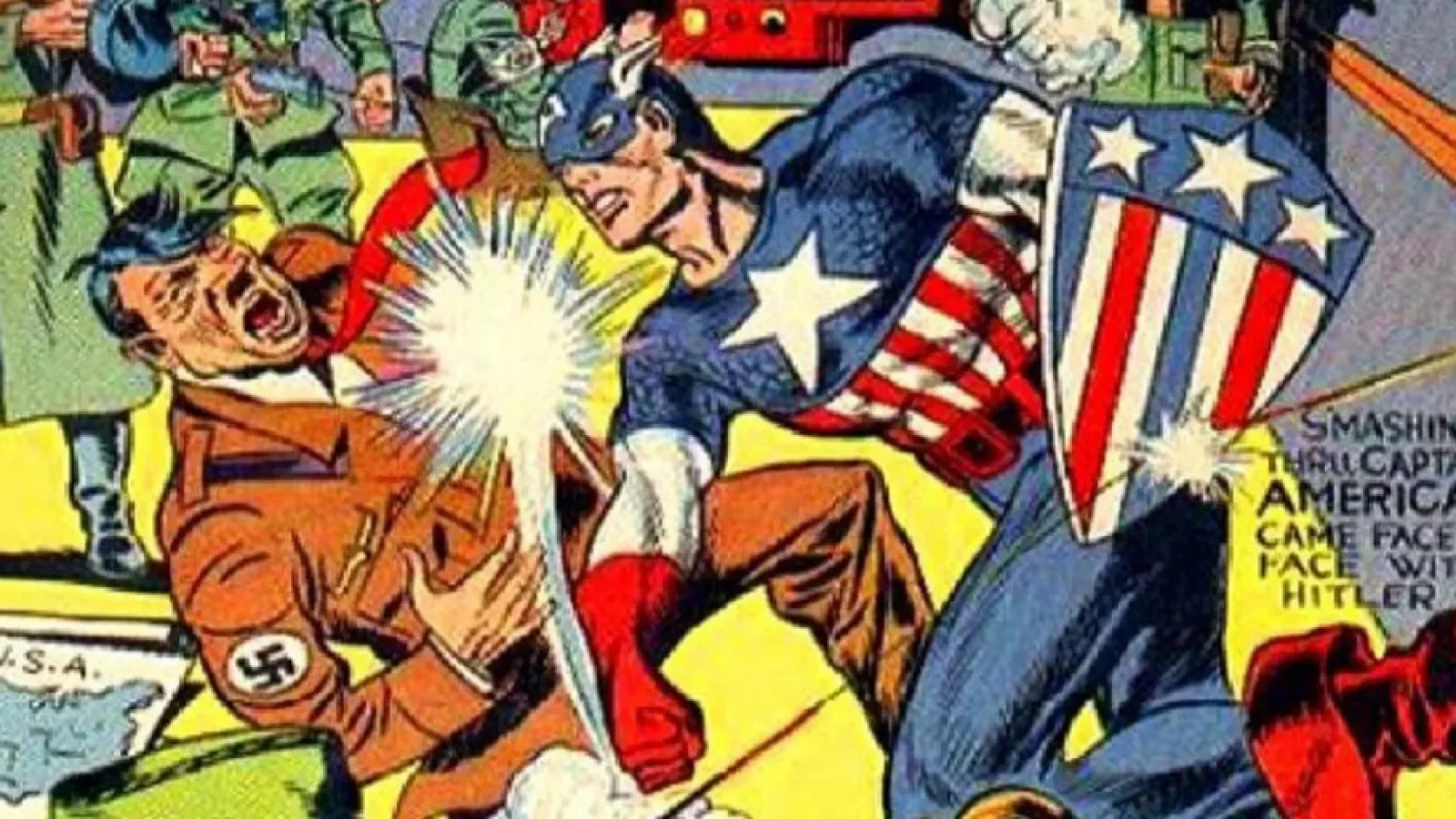Why Superheroes Didn't End World War II
Could this be a job for Superman? Marvel answered the equivalent question in the affirmative, introducing Captain America with a cover of him punching Hitler in the face, months before Pearl Harbor. Captain America could be involved in World War II because, even though he was a super soldier, there was no expectation that he could turn the tide alone. Instead, Captain America was an aspirational figure, a useful symbol in a mobilization campaign. Superman is another matter. Even at his 1940s power levels, the Man of Steel could have been a game-changer. Throw in the Green Lantern, the Flash, Doctor Fate, and the Spectre, and the war could have been won in days rather than years.
Good people on both sides, I’m sure
At the time, the future DC characters tended to restrict their adventures to the home front. Decades later, in the 1980s, writers explained that the Justice Society (the Golden Age DC superheroes on what was then Earth-Two) was kept out of the war in Europe by the magic Spear of Destiny, which was in Hitler's hands. This is an obvious deviation from actual history, but it was made in the service of keeping the overall shape of World War II consistent with its development in the real world. [1]
The very fact that it took forty years for someone to bother to explain why DC superheroes didn't liberate Europe and prevent the Holocaust is a testament to just how much the culture and expectations around superhero comics had changed in the interim. [2] It is unlikely that contemporary readers (including a significant portion of the armed services) were wondering why Superman wasn't singlehandedly ending the war, or, for that matter, why Wonder Woman, one the few DC heroes whose origins were linked to the war, met such limited success in her fight against the Nazis. It would only be with the rise of tighter continuity, the development of fan culture, the participation of former fans as writers and artists, and the changes in Americans' social consciousness that superheroes could reasonably by imagined having the capability to change the world, not to mention the obligation to try.
This is also why modern Marvel comics were in a better position than their competitors to begin incorporating real-world social issues in their heroic fantasy adventures. Marvel as we know it begins in 1961, with the Civil Right Movement well underway, the counterculture only a few years off, and The Feminine Mystique published just two years later. Stan Lee and John Romita Sr. gave the Daily Bugle a Black editor (and foil for J. Jonah Jameson) in The Amazing Spider-Man 51 (August 1967), just a year after Lee and Kirby introduced the Black Panther in Fantastic Four 52. Marvel's women would only start expressing feminist views after Lee stopped writing (his female characters had a tendency to simper), while the counterculture would be depicted with varying degrees of cringe throughout the decade. A few years later, at DC, Denny O'Neil and Neal Adams run on Green Lantern/Green Arrow would kick off a movement for "relevance" in comics, with the "hard-traveling heroes" confronting environmental pollution, racism, overpopulation, and addiction. This run introduced John Stewart, the first Black Green Lantern, who later went on to star in DC's animated Justice League series.
Half a century later, most of these stories read like Exhibit A in the case against having superheroes confront social issues. Perhaps the nadir was the now-infamous "I Am Curious (Black)," Robert Kanigher and Werner Roth's story of Lois Lane's attempts to report from Metropolis's "Little Africa" (a ghetto never seen before or since). Shocked that the residents don't trust a well-intentioned white lady, Lois uses Kryptonian technology to transform herself into a Black woman for the day. She is immediately accepted, and learns more about the struggle of African Americans. The episode ends in one of the great liberal clichés of the 1970s: when a Black activist is shot, only Lois has the rare blood type that can save his life. Even when he discovers that she is white, he still accepts her. The anxiety here is a common one for white liberal race stories of this era: why won't Black people realize that I'm one of the good ones? And why do they have to be so angry?
Yes, someone actually thought this was a great idea
Notes
[1] An issue of Marvel's What If? revealed that Hitler was incinerated in his bunker by the original Human Torch, an event that became part of Marvel canon. Again, though, this was only a detail: Hitler still died on the date he did in our world.
[2] It was also a testament to writer Roy Thomas's lifelong commitment to the heroes of his very early childhood. Born in 1940, Thomas resurrected nearly all the major superhero properties at both Marvel and DC over the course of his career, retroactively creating World War II-era superteams for each (the Invaders and the All-Star Squadron, respectively).
Next: Drugs Are Bad, m’kay?

